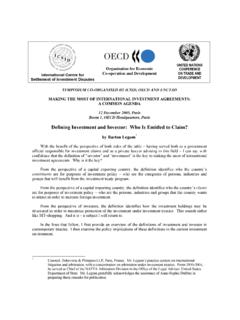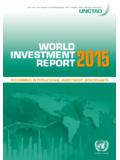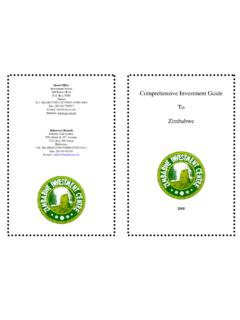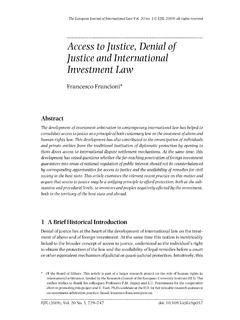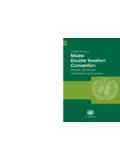Transcription of Dispute settlement provisions in international …
1 Dispute settlement provisions in international investment agreements: A large sample survey Organisation for Economic Co-operation and Development investment Division, Directorate for Financial and Enterprise Affairs Paris, France The OECD-hosted Freedom of investment (FOI) Roundtable helps governments design better policies to reconcile openness to international investment with legitimate regulation in the public interest. Governments from all regions of the world participate in the Roundtable. This survey has been prepared to support the Roundtable's ongoing discussions about investor-state Dispute settlement (ISDS).
2 This document does not necessarily reflect the views of the OECD or those of its member governments or other governments participating in the Freedom of investment Process. It cannot be construed as prejudging ongoing or future negotiations or disputes arising under international investment agreements. More information about the FOI process is available at This work is published on the responsibility of the Secretary-General of the OECD. This document and any map included herein are without prejudice to the status of or sovereignty over any territory, to the delimitation of international frontiers and boundaries and to the name of any territory, city or area. investment Division, Directorate for Financial and Enterprise Affairs Organisation for Economic Co-operation and Development 2 rue Andr -Pascal, Paris 75116, France OECD 2012 3 TABLE OF CONTENTS EXECUTIVE SUMMARY.
3 5 INTRODUCTION .. 7 A. FREQUENCY AND EVOLUTION OF ISDS provisions IN investment treaties .. 8 1. Providing access to domestic courts and/or international arbitration .. 8 2. Relation between judicial review in the host state and international arbitration .. 10 a. Choice .. 10 Choice final and exclusive .. 10 Choice not final or exclusive .. 11 b. Chronological sequence .. 11 c. Subject matter .. 12 d. Miscellaneous criteria .. 13 B. ACCESS TO ISDS .. 14 1. Limitations on access .. 14 a. Subjects of claims ratione materiae limitations .. 14 b. Ratione temporis limitations and non-confrontational settlement attempts .. 15 Cooling-off periods .. 15 Preliminary non-confrontational Dispute settlement procedures.
4 15 Statutes of limitation .. 16 c. Claimants Ratione personae limitations .. 18 2. Access to international arbitration choice of forum .. 18 a. Available fora .. 18 b. Choice among international arbitration tribunals .. 20 c. Arbitration rules .. 22 C. ASPECTS OF ARBITRATION PROCEEDINGS .. 24 1. Initial phase of proceedings composition of the tribunal and place of arbitration .. 24 a. Composition of arbitral tribunals .. 24 b. Qualification and impartiality of arbitrators .. 25 Qualification of arbitrators .. 25 Impartiality of arbitrators .. 26 c. Place of arbitration .. 26 2. Applicable law .. 27 3. Provisional and final remedies .. 29 a. Provisional remedies and injunctive relief.
5 29 b. Final remedies .. 30 4. Regulating diplomatic support and invocation of state immunity .. 31 a. Regulating diplomatic support .. 31 b. Regulating invocation of state immunity .. 32 4 5. Allocation of costs .. 33 6. Legal status of awards and enforcement .. 34 7. Transparency, accountability and quality .. 35 a. Public access to procedures and 35 b. Involvement of experts, amici curiae, and non-disputing parties .. 35 c. Requirement to provide reasons for decisions .. 36 KEY FINDINGS .. 37 I. Light regulatory approach -- Most investment treaties deal with a limited set of issues .. 37 II. Only a few issue categories are found in the treaties , but coverage of these issues varies.
6 37 III. Growing detail of ISDS provisions .. 38 a. The detail of ISDS provisions has increased over time .. 39 b. A few countries adopt a very comprehensive approach to ISDS provisions .. 40 IV. Variations in treaty language, big and small .. 41 V. Asymmetric provisions .. 42 VI. Legacy of old treaties in a country s treaty population .. 42 VII. Editorial anomalies .. 42 ANNEX 1: METHODOLOGY .. 43 ANNEX 2: TREATY SAMPLE .. 45 ANNEX 3: ACKNOWLEDGEMENTS .. 54 5 EXECUTIVE SUMMARY 1. This document surveys Investor-State Dispute settlement (ISDS) provisions in a sample of 1,660 bilateral investment treaties (BITs) and other bilateral agreements with investment chapters (mainly Free Trade Agreements, FTAs).
7 The treaties in the sample were concluded by the 54 countries that participate in the Freedom of investment (FOI) Roundtables with any other country1, regardless of whether these treaties are in force or not. In some cases, the bilateral treaties are also compared with selected multilateral agreements with investment chapters ( NAFTA, Energy Charter Treaty) . 2. The survey presents a statistical portrait of ISDS provisions of this treaty sample that is both comprehensive and detailed. The intention is to provide a factual and statistical catalogue of treaty content and not to in any way engage the OECD or countries participating in the FOI process regarding interpretation of treaty language in an arbitral setting.
8 3. The survey is restricted to a descriptive analysis of the language used in ISDS provisions , defined as either separate ISDS sections or articles or as the Dispute settlement content of expropriation clauses. The survey refrains from interpreting treaty language, beyond what is required for statistical categorisation; it does not use or allude to external interpretations or doctrinal analysis of treaty language and refrains from assessing the merits of various approaches to establishing ISDS systems. 4. The survey sheds light on various aspects of ISDS provisions , including the frequency of their use, both in the entire sample and by individual countries, as well as treaty practice in relation to seventeen major ISDS issues identified ( remedies, cost allocation, coordination of domestic court proceedings and international arbitration).
9 5. The key findings of the survey include: 93% of the treaties contain language on ISDS. Most of the treaties deal with only a few ISDS issues. Seventeen ISDS issues were identified in the treaty sample, but countries propensity to cover individual issues varies widely. Some of the issues that are not dealt with in treaties may be covered in other sources, such as rules provided in ICSID and UNCITRAL instruments. In addition to major differences among treaties and country practice in terms of major ISDS issues ( remedies, cost allocation, coordination of domestic court proceedings and international arbitration), fine variations in details of language are also a feature of treaty language.
10 The determination as to whether any of these fine variations in language have any legal significance is beyond the scope of the present survey. 56% of the treaties offer investors the possibility to choose from among at least two arbitration fora. The number of fora that treaties offer investors to choose from has increased over time; ICSID and ad hoc arbitral tribunals established under UNICTRAL rules are by far the most frequently proposed fora. 1 Austria, Argentina, Australia, Belgium, Brazil, Canada, Chile, China, Colombia, Costa Rica, Czech Republic, Denmark, Egypt, Estonia, Finland, France, Germany, Greece, Hungary, Iceland, India, Indonesia, Ireland, Israel, Italy, Japan, Korea, Latvia, Lithuania, Luxembourg, Malaysia, Mexico, Morocco, Netherlands, New Zealand, Norway, Peru, Poland, Portugal, Romania, Russian Federation, Saudi Arabia, Serbia, Slovakia, Slovenia, South Africa, Spain, Sweden, Switzerland, Tunisia, Turkey, Ukraine, United Kingdom, and United States.











